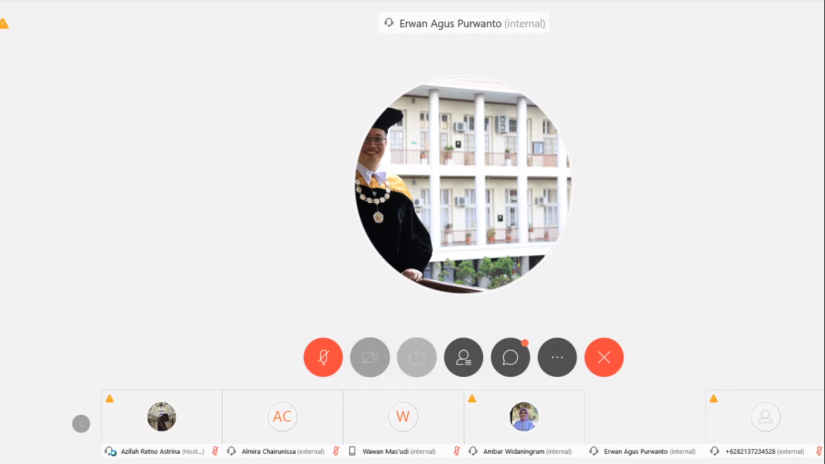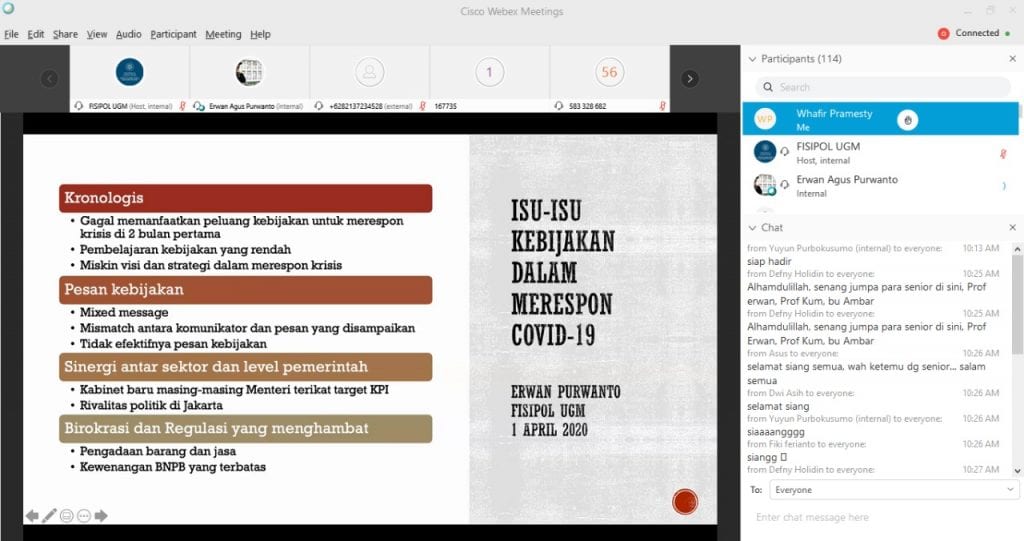
Yogyakarta, April 1st 2020—On dealing with an unprecedented crisis that could trigger a fundamental social, political, and economic change worldwide, the Faculty of Social Science and Politics of Gadjah Mada University held a discussion series titled “COVID-19 Crisis Management”. These discussion series are held in order to understand the dynamics and management of response of the Covid-19 pandemic. The discussion is also held to give feedbacks to various stakeholders.
The discussion about Covid-19 crisis management will be divided into six series in which all of them will be held through video conference platform called Cisco WebEx. The first series of discussion titled “Policy Dynamics of COVID-19 Crisis” was held on Wednesday, April 1st 2020 on 01.00 pm. This discussion, which was attended by 211 people, had Prof. Dr. Erwan Agus Purwanto, Prof. Dr. Wahyudi Kumorotomo, and Dr. Ambar Widaningrum as the speakers. The moderator of this discussion was Ms. Azifah R. Astrina, SIP, M.A.

Covid-19 started on November 2019 in China. However, this situation did not inspire the government of Indonesia to take preventive measures. Hence, the number of Covid-19 case in Indonesia have continually increased since March 2020. According to Mr. Erwan, the government’s failure of handling the crisis can be attributed to the failure to maximize their effort in the first two months.
Lack of attention to the policies, a government that lacks vision and strategy in responding to the crisis, and the ineffective policy also contributes to the mismatch between communicators and the message that wants to be conveyed. There is also a lack of synergy between local governments in handling the case, which is shown through the political rivalry in Jakarta and the new cabinet of ministers that is tied to KPI target. Other than that, bureaucracy and regulation that stifles the supply of services and products and the BNPB’s lack of power also contributes to the overall problem.
In light of the government’s late response to Covid-19, Mr. Wahyudi highlighted several points that contributes to the problem. He said that there was a lack of anticipation from the government, clear monitoring, coordination, and policy compliance from the citizens. There were also unclear information, disaster-preparedness problem, and a weak health infrastructure.
“What I am concerned about is the Health Ministry who asks citizens to pray instead of actually preventing the spread of Covid-19 in Indonesia. Only when WHO’s director general write to us about the need of Indonesia’s government to take preventive measures that the government starts to realize that Indonesia is severely underprepared,” said Mr. Wahyudi.
The government seemingly tries to mend the unpreparedness of responding to Covid-19 by taking corrective measures. Ms. Ambar appreciates these measures. “I personally believe that we do need to appreciate the government first. There are already policies such as President Policy number 4 on Covid Management which is followed by President Policy number 9 on creating a task force. There are also a President Instruction for Activity Refocusing which includes Budget Reallocation, permission for health workers, and so on. These are the first steps that the president have taken,” said Ms. Ambar.
Looking back to our history, the current condition is a repetition of the past. Ms.Ambar said that on 1918 there was a Spanish virus that kills a lot of people in Java. During these times, the colonial government’s response was as unprepared as now, but it was corrected right away.
According to Ms. Ambar, in this situation we need to bravely complain about the government’s unprepared actions which reflects the commitment of the government. Citizens also need to pay attention to the coordination of management in all level as well as the inclusion of all stakeholder in the existing policy. Other than that, the education sector is also important in determining the response to the government policy of Covid-19. In this case, FISIPOL UGM have contributed by conducting this discussion series.
After every speaker have told their opinion, the moderator concluded all the remarks and opened a session for questions and answers. There were some audio errors but the discussion still went smoothly. After the discussion, the discussion was uploaded on FISIPOL UGM’s Youtube channel. Therefore, the discussion can be watched by those who did not join the meeting or those who are seeking to understand the discussion deeper. The discussion ended on 3 pm.
Translator : Ni Made Diah
